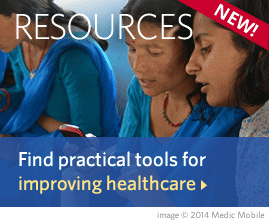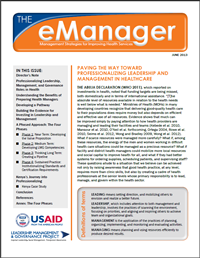
Ce numéro de The eManager appelle à la création d'une culture de gestion et de leadership à tous les niveaux, fournit des exemples de progrès à cette fin dans plusieurs pays à court terme, et propose une approche à plus long terme pour professionnaliser le leadership, le management, et gouvernance dans le secteur de la santé. La professionnalisation comprend la reconnaissance de la valeur des gestionnaires de la santé, établir des parcours de carrière clairs, et fournir la préparation dont ces personnels nous disent avoir besoin.
En savoir plus...
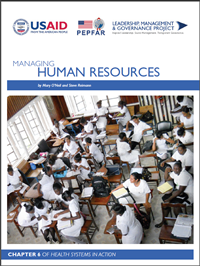
This publication shows that effective human resource management (HRM) is important in any public- or private-sector organization and essential when public health crises collide with workforce shortages. We present here the three pillars that together form the HRM capacity of an organization—policies, les systèmes, and management and leadership practices—and describe how they can help you to attain your organization’s HRM goals.
En savoir plus...
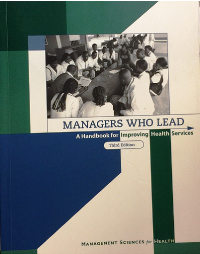
Managers Who Lead permet aux responsables de la santé à tous les niveaux d'une organisation de diriger des équipes pour relever des défis et obtenir des résultats. Il répond à des questions telles…
En savoir plus...
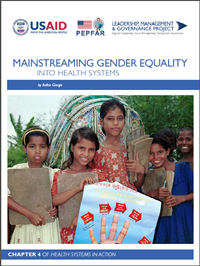
In this publication we will review concepts, des approches, and tools that will help you bring about a change of perspective in designing and implementing policies and programs in health, specifically in relation to gender. The chapter explores the myths and realities regarding gender, the concept of gender mainstreaming and how to move towards this goal, discusses how to conduct a gender analysis and provides links to relevant tools, discusses gender integration into programming and the gender integration continuum, and offers insights into how to integrate gender considerations into the health system using the lens of the WHO health systems building blocks. (This publication is Chapter 4 of Health Systems in Action: An eHandbook for Leaders and Managers.)
En savoir plus...
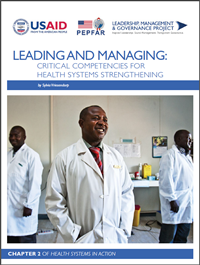
People-centered health systems cannot be strengthened without good management and leadership. This publication shows how you, as a manager of a health program or health services, can apply proven practices for managing and leading to address the challenges you face. Leadership and management skills are needed at all levels of the health system. This chapter throws light on the topic by focusing on behaviors that managers and providers can use in any setting, whether in a community health post or the national Ministry of Health.
En savoir plus...
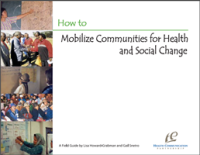
This field guide has been designed to be used by health program directors and managers of community-based programs who are considering using community mobilization to improve health at the individual, famille, and community level. It may also be useful for directors and technicians in governmental and nongovernmental organizations working in public health and human development and other groups and organizations committed to community health, such as churches, universities, philanthropists, and donors.
En savoir plus...

The eHandbook emphasizes the central, critical element of every health system: personnes. It shows how to build leadership and management skills for yourself and your organization. It also covers management of the specific systems essential to an overall health system – governance, des ressources humaines, les finances, supply chain management, health information and association monitoring and evaluation, and health service delivery. This tool can also be accessed as individual topical chapters.
En savoir plus...
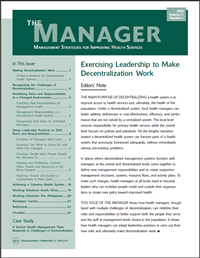
This issue of The Manager shows how health managers, though faced with multiple challenges of decentralization, can redefine their roles and responsibilities to better support both the people they serve and the staff at management levels closest to the population. It shows how health managers can adopt leadership practices to carry out their new roles and ultimately make decentralization work.
En savoir plus...
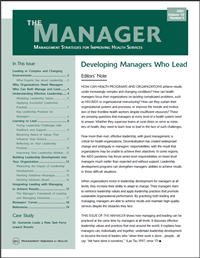
This issue of The Manager shows how managing and leading can be practiced at the same time by managers at all levels. It discusses effective leadership values and practices that exist around the world. It explains how managers can, individually and together, undertake leadership development to become the kind of leaders who “when their work is done…personnes…all say: ‘We have done it ourselves.’ ” (Lao Tsu 1997, verse 17)
En savoir plus...

This publication makes the case for putting people at the center of health systems strengthening. When you examine the management systems that make up the overall health system—leadership and governance, des ressources humaines, financial management, health information, supply management, and health service delivery—you will see that none of them can operate without skilled and motivated people.
En savoir plus...














